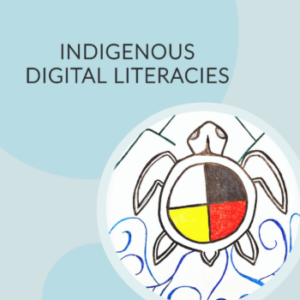
*Note: This session has passed. Please view the resources and recording below.
This one-hour webinar will introduce participants to some newly released, openly licensed materials in the Digital Literacy collection that focus on weaving Indigenous ways of knowing into technology-supported teaching and learning practices.
In conversation with the authors, participants will get a brief overview of what is available, plus specific ideas for how to apply these ideas and tools to bring reconciliation into teaching and learning practices. These materials were created to support learning about Indigenous-specific considerations associated with each of the eight digital literacy competencies in the B.C. Post-Secondary Digital Literacy Framework.
Some questions include: What ethical and legal responsibilities do educators and students have when working with Indigenous data? Or more broadly: How can we make learning spaces – including online – more culturally inclusive for the benefit of all students?
This webinar will interest post-secondary educators, learning and curriculum designers, and those seeking ways to decolonize and improve learning spaces and practices for all students.
Recording and Resources
- Transcript – Weaving Indigenous Ways of Knowing into Digital Literacy (PDF)
- Transcript – Weaving Indigenous Ways of Knowing into Digital Literacy (Word)
- Slides – Weaving Indigenous Ways of Knowing into Digital Literacy (PDF)
About the Facilitators
Connie Strayer
Connie is both Métis and German. She was raised as a guest on the unceded and traditional territory of the Stz’uminus Peoples and currently lives, works, and plays on the unceded lands of the Qualicum and Snaw-Na- Was First Nations.
Connie is grateful for her 25+ years of experience as an educator in the K-12 system, Band-operated schools and public post-secondary education. She holds a master’s degree in educational administration and leadership from the University of British Columbia, which focused on Indigenization and the decolonization of education.
The desire to bring forward an understanding of Indigenous ways of being is based on her lived experiences within a colonial system that has a history of misunderstanding Indigenous ways of knowing and being. Her connection to the land and her community reflects her worldview and her understanding of education, law, governance, relations, and protocols.
She believes reconciliation is a process of naturalizing Indigenous Knowledge Systems and making them evident to transform spaces, places, and hearts. In the context of post-secondary education, this involves bringing Indigenous Knowledges and approaches together with western knowledge systems.
Robyn Grebliunas
Robyn is both Métis and Lithuanian. She was raised as a guest on the unceded and traditional territories Nlaka’pamux and Syilx Nations and lives, works, and plays on the unceded lands of the Okanagan and Syilx Nations.
Robyn is grateful for over 25 years working in public and private Indigenous post-secondary education. She has a master’s degree in professional communication from Royal Roads University. Her research focused on creating communication efficacy and success in professional relationships in the digital realm.
Robyn is excited that she has been able to use this research, along with her extensive teaching experience, in creating success in online and blended education. Robyn carries an educational philosophy combining traditional grassroots learning with a belief in two-way learning where the teacher is also a learner, and the learner is also a teacher.
Robyn believes planting a seed of knowledge in one mind can create generational change, and planting seeds of knowledge in many minds can have a global impact.
Robyn has had the honour of working under the teachings of many Indigenous Elders and Knowledge Keepers, and in many First Nations communities in B.C. and Alberta; this opportunity has greatly influenced her approach to education.
